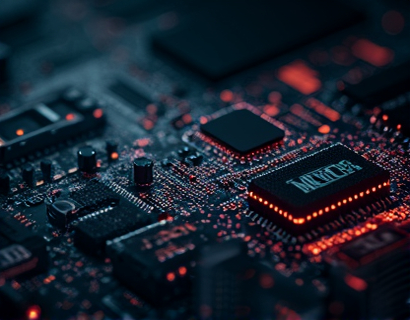Optimize Your DeFi Trading with Advanced Smart Contract AMMs
In the rapidly evolving world of decentralized finance, or DeFi, traders and enthusiasts are constantly seeking ways to enhance their trading experiences. One of the most significant advancements in this space is the integration of advanced smart contract Automated Market Makers (AMMs). These AMMs are designed to revolutionize liquidity management and automated trading strategies, offering a seamless and efficient market interaction for crypto traders. This article delves into the intricacies of these technologies, exploring how they can elevate your DeFi trading game.
Understanding Smart Contract AMMs
Traditional AMMs rely on algorithms to determine the price of assets based on the liquidity provided by users. However, smart contract AMMs take this a step further by utilizing blockchain technology to create decentralized and transparent marketplaces. These smart contracts automatically execute trades based on predefined rules, eliminating the need for intermediaries and reducing the risk of manipulation.
Smart contract AMMs operate on a liquidity pool model, where users deposit pairs of cryptocurrencies to create a pool. The value of each asset in the pool is represented by a unique token, often called a liquidity token. These tokens are tradable on the blockchain, allowing users to add or withdraw liquidity at any time. The pricing mechanism is governed by the AMM formula, typically involving the product of the two asset quantities in the pool, ensuring liquidity provision is incentivized.
Enhanced Liquidity Management
One of the primary benefits of using smart contract AMMs is the enhanced liquidity management they offer. Traditional exchanges often suffer from liquidity issues, especially for lesser-known assets, leading to wider bid-ask spreads and less favorable trading conditions. Smart contract AMMs mitigate this problem by allowing users to provide liquidity directly on the blockchain, ensuring that even niche assets remain tradable with tight spreads.
Moreover, the decentralized nature of these AMMs means that liquidity is not controlled by a single entity, reducing the risk of liquidity being pulled out unexpectedly. This creates a more stable and reliable trading environment, which is crucial for long-term investors and traders alike. Users can monitor and manage their liquidity pools in real-time, adjusting their positions as market conditions evolve.
Automated Trading Strategies
Smart contract AMMs are not just about liquidity provision; they also empower traders to implement sophisticated automated trading strategies. By leveraging the transparency and programmability of smart contracts, users can create complex trading algorithms that execute trades based on specific conditions.
For instance, a trader can set up a strategy to automatically rebalance their portfolio when the price of a particular asset crosses a certain threshold. This can be achieved by using the liquidity tokens to execute trades directly within the AMM. The smart contract ensures that the trade is executed instantly and without human intervention, minimizing the risk of missed opportunities due to slow execution times.
Another advanced strategy is arbitrage, where traders exploit price discrepancies across different exchanges. Smart contract AMMs facilitate this by allowing users to automatically detect and capitalize on these discrepancies. The AMM's pricing engine ensures that the trade is executed at the optimal price, maximizing profits and minimizing slippage.
Improved Market Efficiency
The use of smart contract AMMs significantly improves market efficiency in several ways. First, the transparency of blockchain technology ensures that all market participants have access to the same information, reducing information asymmetry and promoting fair trading practices. This transparency also deters manipulative activities such as wash trades and spoofing, as these actions would be immediately visible on the blockchain.
Additionally, smart contract AMMs reduce the need for centralized exchanges, which often charge high fees and have centralized points of failure. By decentralizing trading, these AMMs lower transaction costs and increase the resilience of the financial system. Users can trade directly with each other, fostering a more democratic and inclusive market.
Enhanced Security and Trust
Security is a paramount concern in the DeFi space, and smart contract AMMs are designed with robust security features to protect user assets. The immutable nature of smart contracts ensures that once deployed, they cannot be altered or tampered with, providing a high level of trust. Additionally, the use of formal verification and audits by reputable security firms further enhances the reliability of these contracts.
Smart contract AMMs also offer greater control over funds, as users retain ownership of their assets throughout the trading process. This is in contrast to traditional exchanges where users must trust the exchange to hold and manage their assets. In the event of a hack or failure, users in a DeFi setup have more control over their funds and can take immediate action to mitigate losses.
User-Friendly Interfaces and Integration
Despite their complexity, smart contract AMMs are becoming increasingly user-friendly. Many platforms provide intuitive interfaces that simplify the process of deploying liquidity pools and executing trades. These interfaces often include features such as real-time market data, portfolio management tools, and customizable trading strategies, making it easier for both novice and experienced traders to navigate the DeFi ecosystem.
Integration with other DeFi protocols and services is another key advantage. Smart contract AMMs can seamlessly interact with lending platforms, yield farming opportunities, and other DeFi applications, creating a cohesive and interconnected financial system. This interoperability allows users to optimize their entire DeFi portfolio, maximizing returns and minimizing risks.
Challenges and Considerations
While smart contract AMMs offer numerous benefits, there are also challenges and considerations that users should be aware of. One of the primary concerns is the complexity of smart contracts themselves. Users need to have a basic understanding of how these contracts work to fully leverage their potential. Additionally, the risk of smart contract bugs or vulnerabilities, although rare, cannot be entirely eliminated.
Gas fees on the blockchain can also impact the cost-effectiveness of trading on smart contract AMMs. While these fees are generally lower than those on centralized exchanges, they can still add up, especially during periods of high network congestion. Users should monitor gas prices and optimize their trading strategies accordingly.
Future Developments and Innovations
The landscape of smart contract AMMs is rapidly evolving, with ongoing developments aimed at addressing current challenges and enhancing user experience. One area of focus is the improvement of scaling solutions to reduce gas fees and increase transaction speeds. Layer 2 protocols and rollup solutions are being explored to achieve this, making DeFi trading more accessible and affordable.
Another exciting development is the integration of advanced analytics and machine learning algorithms within AMMs. These tools can provide users with deeper insights into market trends and help refine their trading strategies. By leveraging data-driven approaches, traders can make more informed decisions and potentially achieve better results.
Furthermore, the exploration of cross-chain interoperability is set to expand the reach of smart contract AMMs. By enabling assets to move seamlessly between different blockchain networks, users will have access to a broader range of liquidity pools and trading opportunities, further enhancing the DeFi ecosystem.
Conclusion
Smart contract AMMs represent a significant leap forward in DeFi trading, offering enhanced liquidity management, automated trading capabilities, and improved market efficiency. By leveraging the power of blockchain technology, these platforms provide a transparent, secure, and user-friendly trading experience. As the DeFi landscape continues to evolve, smart contract AMMs will play a crucial role in shaping the future of decentralized finance, empowering traders and enthusiasts to achieve their financial goals with greater ease and confidence.











































